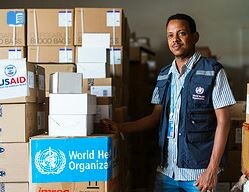The Sudanese health ministry welcomed a shipment of medical aid from the World Health Organization (WHO) and Japan International Cooperation Agency (JICA) in Port Sudan on Tuesday.
Health Minister Haitham Ibrahim expressed gratitude for the support from WHO and JICA, underscoring the importance of the aid. He said the consignment of emergency drugs, medical supplies, and surgical consumables can treat 230,000 individuals.
The handover ceremony was attended by the WHO Regional Director Hanan Balkhi and officials from both WHO and the Sudanese health ministry.
During her inaugural visit, Balkhi acknowledged the efforts of Sudan’s healthcare system in achieving health goals. She stressed Sudan’s need for assistance amid numerous healthcare challenges.
“This grant exceeds 40 tons and I hope that our visit will effectively meet its objectives,” she said. “I urged the health ministry to promptly distribute the medical aid to citizens. WHO will continue supporting the health sector in Sudan.”
Balkhi arrived in Sudan on Tuesday, marking her first visit since assuming the role in February last year.
Sudan’s Health Minister, Haitham Ibrahim, emphasized the significance of this visit amid the current circumstances and ongoing war in the country.
The World Health Organization has previously declared Sudan’s health situation to be at a critical stage due to the ongoing conflict in the country.
The organization aims to bolster its operations in Sudan, with its main office located in Port Sudan and branches established in various states. These facilities offer technical and logistical support for healthcare initiatives and facilitate the delivery of humanitarian aid to states, as agreed upon with the Federal Ministry of Health and the Government of Sudan. The visit spans two days, from March 12 to 13 March.
Since April 15th of last year, Sudan has been witnessing military confrontations between the Sudanese Army and the Rapid Support Forces, exacerbating the humanitarian crisis. This conflict has resulted in the loss of thousands of lives and the displacement of millions of Sudanese, both internally and externally.




